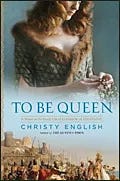To Be Queen, a prequel to The Queen's Pawn, portrays Eleanor of Aquitaine's story from the time she is ten through the annulment of her marriage to Louis VII of France when she is twenty-five. Not all readers will warm to young Alienor, as Eleanor was named in the langue d'oc, the language of her sunny, southern French homeland. Given what we know of the iron-willed woman reflected in the historical record, the novel's portrait of a keenly intelligent, self-assured and determined child with a sense of grievance against the world seems more plausible than a cozily sympathetic portrayal would be.
"I, too, would become a bird of prey," Alienor reflects, training her first falcon. "One must, to be queen." Because her only brother died young, she is groomed from childhood to become heir to her father, the Duke of Aquitaine: charming, aware of her subjects' needs and protective of them, but politically shrewd and even ruthless when expedience demands it. She memorizes the names of her father's spies, "secret, even one member from another, but I knew them all." She wants more, though, than to be duchess. Married at fifteen to the priest-ridden, piously cowed Louis and immured in a dank, dirty castle in Paris where subservience and ignorance are expected of women, her refrain becomes "A woman must tear out her heart to be queen." Still, she tears it out with a will.
While To Be Queen is a novel of a woman's political ambition, it also shows Eleanor mellowing as she gains experience. She feels tenderness for Louis even while she manipulates him and despises his inadequacies. For the few men who spark her passion she is capable of intense love, even to the point of jeopardizing her position. Henry of Anjou, the future Henry II of England, shows up in the closing chapters, and ambition and passion unite in a love scene as hot as much of the novel is chilly. (2011; 380 pages, including an Afterword about Eleanor's later life)




